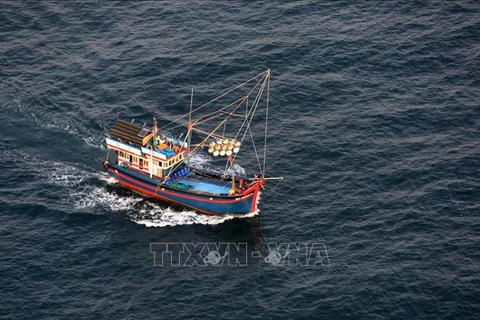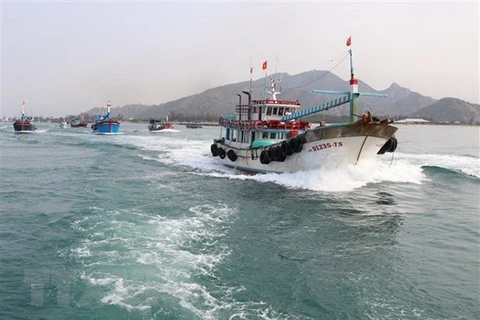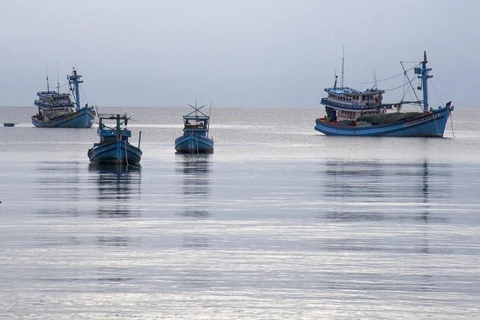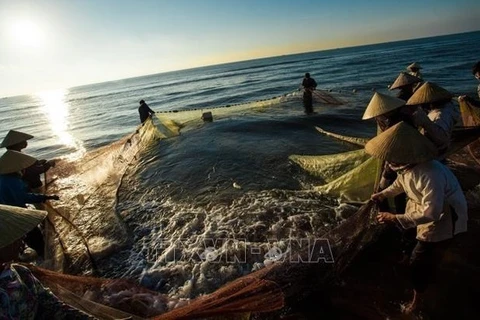Hanoi (VNA) – Installing vessel monitoring systems (VMS) is one of the important measures the European Commission (EC) recommended for Vietnam to remove the EC’s “yellow card” warning against illegal, unreported, and unregulated (IUU) fishing.
The Directorate of Fisheries has certified eight VMSs that meet the standards stipulated in the Government’s Decree No. 26/2019/ND-CP.
As of August 2021, 26,915 fishing boats, equivalent to 87.45 percent of the total, had been equipped with VMSs whose signals were recorded by the directorate’s surveillance system. Among them, 3,000 vessels in 28 coastal provinces and centrally-run cities had satellite-based VMSs under Movimar, a cooperation project between Vietnam, represented by the management board for agricultural projects under the Ministry of Agriculture and Rural Development, and France, represented by the Collecte Localisation Satellites (CLS) company.
A central vessel monitoring network and two monitoring stations based in northern Hai Phong city and southern Ba Ria - Vung Tau province were set up, enabling authorities to practice real-time surveillance of vessels working at sea so as to detect boats breaking anti-IUU fishing rules and assist fishermen in emergencies.
Luong Do, Institutional Relationship Manager at CLS Vietnam, said with much experience gained during the implementation of the Movimar project, the country’s relevant agencies can build appropriate regulations and a comprehensive fishery management information system, thus helping to improve the monitoring, management, and support for fishing activities in Vietnam.
The 2017 Law on Fisheries stipulated compulsory installation and around-the-clock operation of VMSs on all the boats that are 15 metres long and over throughout fishing trips. In case VMSs break down, boat owners or captains have to use other communication devices to report their vehicles’ location to fisheries departments or border guard commands every six hours. If they are unable to fix the devices, vessels must return to fishing ports for repair within 10 days since the breakdown.
The law also detailed fines for the intentional shutdown, deactivation, or uninstallation of VMSs.
The vessels permitted to enter ports and unload caught seafood must show all the regulated papers, not commit IUU fishing, and report all of their catch to fishing ports’ authorities. Monitoring data and fishing diaries will be used to determine the catch by vessels 15 metres long and over.
Since the VMS installation was launched, law violations during fishing trips have declined. Notably, some provinces haven’t recorded any vessels that infringed foreign waters and were detained since the start of 2022.
At a teleconference with the 28 coastal provinces and cities in July 2021, the national steering committee for anti-IUU fishing set the target of putting an end to violations of anti-IUU fishing rules in 2022 so as to lift the EU’s “yellow card” warning./.
The Directorate of Fisheries has certified eight VMSs that meet the standards stipulated in the Government’s Decree No. 26/2019/ND-CP.
As of August 2021, 26,915 fishing boats, equivalent to 87.45 percent of the total, had been equipped with VMSs whose signals were recorded by the directorate’s surveillance system. Among them, 3,000 vessels in 28 coastal provinces and centrally-run cities had satellite-based VMSs under Movimar, a cooperation project between Vietnam, represented by the management board for agricultural projects under the Ministry of Agriculture and Rural Development, and France, represented by the Collecte Localisation Satellites (CLS) company.
A central vessel monitoring network and two monitoring stations based in northern Hai Phong city and southern Ba Ria - Vung Tau province were set up, enabling authorities to practice real-time surveillance of vessels working at sea so as to detect boats breaking anti-IUU fishing rules and assist fishermen in emergencies.
Luong Do, Institutional Relationship Manager at CLS Vietnam, said with much experience gained during the implementation of the Movimar project, the country’s relevant agencies can build appropriate regulations and a comprehensive fishery management information system, thus helping to improve the monitoring, management, and support for fishing activities in Vietnam.
The 2017 Law on Fisheries stipulated compulsory installation and around-the-clock operation of VMSs on all the boats that are 15 metres long and over throughout fishing trips. In case VMSs break down, boat owners or captains have to use other communication devices to report their vehicles’ location to fisheries departments or border guard commands every six hours. If they are unable to fix the devices, vessels must return to fishing ports for repair within 10 days since the breakdown.
The law also detailed fines for the intentional shutdown, deactivation, or uninstallation of VMSs.
The vessels permitted to enter ports and unload caught seafood must show all the regulated papers, not commit IUU fishing, and report all of their catch to fishing ports’ authorities. Monitoring data and fishing diaries will be used to determine the catch by vessels 15 metres long and over.
Since the VMS installation was launched, law violations during fishing trips have declined. Notably, some provinces haven’t recorded any vessels that infringed foreign waters and were detained since the start of 2022.
At a teleconference with the 28 coastal provinces and cities in July 2021, the national steering committee for anti-IUU fishing set the target of putting an end to violations of anti-IUU fishing rules in 2022 so as to lift the EU’s “yellow card” warning./.
VNA

























